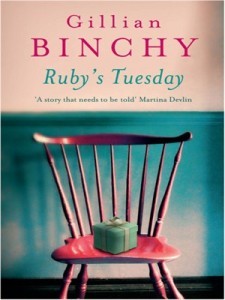Book review: Ruby’s Tuesday
Gillian Binchy – Ruby’s Tuesday
Afric’s husband Luke is away on business when she goes for the routine ultrasound – the one that reveals her unborn child is incompatible with life. Quickly, quietly, she arranges the visit to Liverpool to have the baby delivered now, rather than carry her to full term. For Afric, this ‘fatal foetal abnormalities’ situation – a phrase we hear in the Irish media more than we should, a phrase that shouldn’t need to be politicised but is – is still her daughter, who she names Ruby, and who she shares thoughts and memories with throughout the book.
This is a sad book but also veers towards the cliche at times: a lot of the dialogue feels greeting-cards-ish rather than authentic, particularly between Afric and Luke. The stories Afric relates to Ruby are a little too detailed to feel like dialogue, and I wondered whether addressing the entire novel to Ruby might have worked better. I also wasn’t sure about the organisation of the material – the book begins after the events and then never returns to that point, and it feels a little unfinished.
But. But there is a chapter towards the end, which I believe is based on a real event that prompted writing this story, and it’s utterly amazing. Afric has received a text letting her know her daughter’s remains have been delivered, but they haven’t, so she drives off to a depot, distressed and heartbroken, and ends up on the phone to the delivery man, Michael, who she blurts out the whole story to. That marked-fragile package he has next to him in the front seat is her daughter’s remains. And his response is pitch-perfect: he’s no idea what to say, but he’s so sorry, and it’s salt-of-the-earth Dublin talking to this middle-class lady, and it leaps off the page. And then Afric imagines him later that day, maybe telling the lads in the pub. Maybe telling the wife. Because the wife will know – the wife will explain to him why she had to travel to England to deal with the situation. It’s an incredibly powerful piece of writing, and for me the strongest, most striking part of the whole novel.




